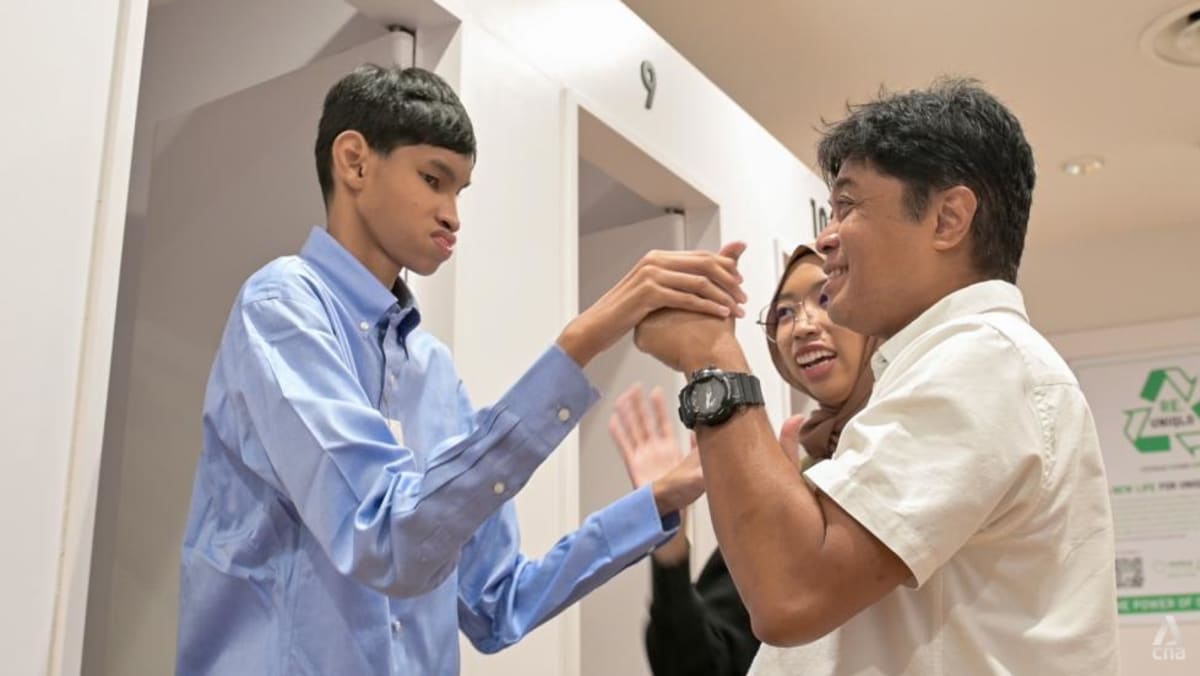Experts and parents of special needs children hail these moves as a good first step, but in practice, how far does it address their needs? And does it bring Singapore closer to being an autism-friendly society?
“I was a bit afraid just now because Dzakwan was getting a bit agitated. But because he had some time for himself and the opportunity to explore a bit, that let him calm down on his own,” she said.
EC House said it chose the first hour of operation as traffic is usually lower, which would allow the company to “approach the event with greater confidence”.
In future, EC House may consider extending the duration of the calm hour or hosting it more frequently, after “observing its effectiveness and assessing any potential operational conflicts”.
“If everything proceeds smoothly, we’ll consider expanding this event to other EC House outlets throughout Singapore,” said a spokesperson.
Likewise, Uniqlo Singapore chief executive officer Yuki Yamada said its current initiative, called Uniqlo Access, is “a starting point”, and the retailer will consider expanding the service to include weekends. It also hopes to expand the service to new and existing outlets in Singapore.
“It’d be great for us to receive more feedback, positive or negative, then we’ll see … how we can adjust our business,” he said. “That’s the way we can go to the next stage.”
While a quiet hour may be helpful for some, parent Rajendran K Sethuraj, 57, pointed out that those on the autism spectrum have diverse needs. His son, for example, has moderate autism and can be all right in loud places but is triggered by a faint smell of bananas.
This is more important to Rajendran: staff who are ready to render support when things go south.
“When there’s a meltdown, (we’re) just focusing (on our child),” he said. If the staff could direct them to the nearest quiet area in the shop or the shopping centre or just ask how they could help, he would find that “very helpful”.
He also hopes these support services can be made more visible, whether with a uniform or a tag the staff can wear or signs showing which store is autism-friendly.
“(The shopping centre) is very huge, right? If you say, ‘we’re autism-friendly’, how’d I know? Where’s what?” he said.
“This kind of outright publicity will (give parents) confidence. … At least they’d know, if something happens, that they aren’t going to be alone or be judged.”
To this end, tenants who are part of Frasers Property’s initiative, as well as front-line and corporate staff, will go through first responder training for autism-related incidents, conducted by St Andrew’s Autism Centre.
“An ultimate goal we have is that in our stores, our customers will be able to also embrace people with disabilities shopping alongside them. If they see someone needing help and being served by our staff, they could have a little bit of patience.”
“The key is to communicate with their caregivers and inquire about how we can make the haircut process more comfortable for them,” said its spokesperson. “It often takes us more time to provide care, but our team is patient and compassionate.”
As for Frasers Property Singapore and why it has invested in its Inclusion Champions programme, CEO Soon Su Lin said shopping centres “are where people from all walks of lives meet and share experiences”.
“It’s therefore imperative for us to embrace and enhance inclusivity. … We believe that we can make a difference by facilitating a more supportive and caring environment at our malls.”
Besides people with autism, the company aims to also support people with dementia. Some shops as well as all customer service counters — totalling 29 points throughout 10 shopping centres — will serve as go-to points for the latter group.
Another concern Trakakis raised is that the provision of these services is patchy in Singapore.
“We need to understand (inclusiveness) as a society, not just … as one or two companies,” he said. “Then anywhere customers go, it’d be the same (treatment).”
CNA Insider checked with two other real estate groups, covering more than 20 shopping centres across the heartlands and the city, and neither have similar initiatives.
Trakakis suggested regulation, whereby there should be mandatory disability awareness training for companies, especially in the service industry. However, Ivan Tan from the SPD believes voluntary initiatives “work better” to create a more inclusive society.
“To influence retailers that can make that change and are willing to make that change — that’s even more impactful, even more powerful than forcing them by law,” said Tan, who is from the SPD’s assistive technology centre and leads a team providing training for corporates.
“(Companies should) do things because (they) want to make the space accessible. … When that happens, the change is real and is deep.”
This content was originally published here.
